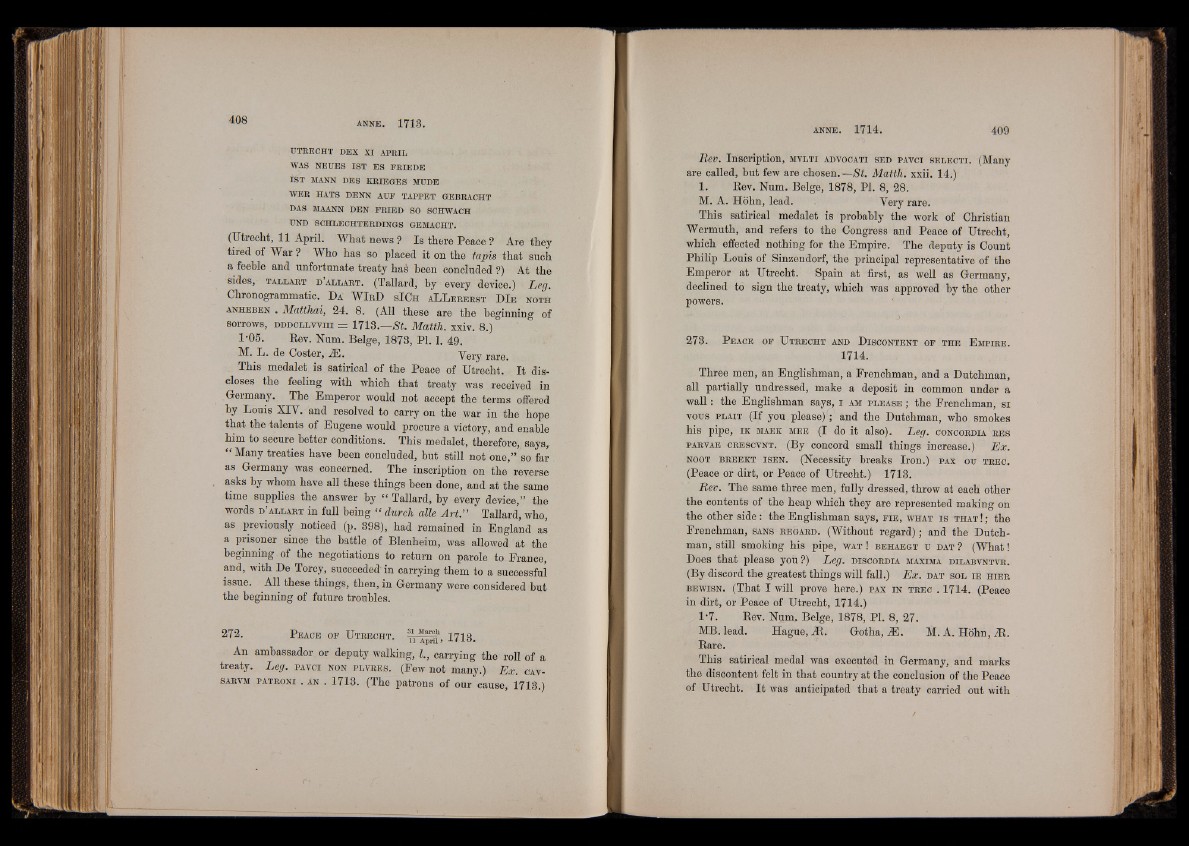
UTBECHT DEX XI APRIL
WAS NEUES IST ES FBIEDE
IST MANN DES KBIEGES MUDE
WEB HATS DENN AUF TAPPET GEBRACHT
DAS MAANN DEN FBIED SO SCHWACH
UND SCHLECHTERDINGS GEMACHT.
(Utrecht, 11 April. What news? Is there Peace ? Are they
tired of War ? Who has so placed it on the tapis that such
a feeble and unfortunate treaty haä been concluded ?) At the
sides, ta l la r t d ’a l l a r t . (Tallard, by every device.) Leg.
Chronogrammatic. Da WIeD sI C h aL L e r e b s t D I e n o th
a n h e b e n . Matthai, 24. 8. (AH these are the beginning of
sorrows, d d d c l l w ih = 1713.—St. Matth. xxiv. 8.)
1-05. Rev. Num. Beige, 1873, PI. 1. 49.
M. L. de Coster, 2E. y ei.y r a r e _
This medalet is satirical of the Peace of Utrecht. It discloses
the feeling with which that treaty was received in
Germany. The Emperor would not accept the terms offered
by Louis XIY. and resolved to carry on the war in the hope
that the talents of Eugene would procure a victory, and enable
him to secure better conditions. This medalet, therefore, saysr
“ Many treaties have been concluded, but still not one,” so far
as Germany was concerned. The inscription on the reverse
asks by whom have all these things been done, and at the same
time supplies the answer by “ Tallard, by every device,” the
words d ’a l l a r t in full being “ durch alle A rt.” Tallard, who,
as previously noticed (p. 398), had remained in England as
a prisoner since the battle of Blenheim, was allowed at the
beginning of the negotiations to return on parole to France,
and, with De Torcy, succeeded' in carrying them to a successful
issue. All these things, then, in Germany were considered but
the beginning of future troubles.
272. P e a c e o f U t r e c h t , 1713.
An ambassador or deputy walking, I., carrying the roll of a
treaty. Leg. pa v c i n o n p l v e e s . (Few not many.) Ex. cav-
sarvm pa t b o n i . an . 1713. (The patrons of our cause, 1713.)
Rev. Inscription, m v l t i advocati s e d pavci s e l e c t i . (Many
are called, but few are chosen.—St. Matth. xxii. 14.)
1. Rev. Num. Beige, 1878, PI. 8, 28.
M. A. Hohn, lead. Yery rare.
This satirical medalet is probably the work of Christian
Wermuth, and refers to the Congress and Peace of Utrecht,
which effected nothing for the Empire. The deputy is Count
Philip Louis of Sinzendorf, the principal representative of the
Emperor at Utrecht. Spain at first, as well as Germany,
declined to sign the treaty, which was approved by the other
powers.
273. P ea c e o f U t r e c h t and D is c o n t e n t o f t h e E m p ir e .
1714.
Three men, an Englishman, a Frenchman, and a Dutchman,
all partially undressed, make a deposit in common under a
wall: the Englishman says, i am p l e a s e ; the Frenchman, si
vous p l a it (If you please) V and the Dutchman, who smokes
his pipe, ik m aek m e e (I do it also). Leg. concordia r e s
pa ev a e c e e s c v n t . ^ (By concord small things increase.) Ex.
n oot b r e e k t i s e n . (Necessity breaks Iron.) pax ou t r e c .
(Peace or dirt, or Peace of Utrecht.) 1713.
Rev. The same three men, fully dressed, throw at each other
the contents of the heap which they are represented making on
the other side : the Englishman says, f i e , w h a t i s th a t !; the
Frenchman, sans r e g a r d . (Without regard); and the Dutchman,
still smoking his pipe, wat ! b e h a e g t u d at ? (What!
Does that please you?) Leg. d isc o r d ia maxima d il a b v n tv b .
(By discord the greatest things will fall.) Ex. dat so l i e tttet?
b ew is n . (That I will prove here.) pax in t r e c . 1714. (Peace
in dirt, or Peace of Utrecht, 1714.)
l -7. Rev. Num. Beige, 1878, PI. 8, 27.
MB. lead. Hague, AL Gotha, M. M. A. Hohn,iR.
Rare.
This satirical medal was executed in Germany, and marks
the discontent felt in that country at the conclusion of the Peace
of Utrecht. It was anticipated that a treaty carried out with